 |
Newsletter |
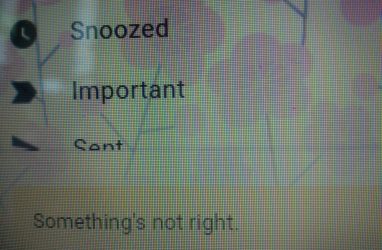 Dear friends, In an age of technological and inspirational solutionism, a proposal to regard collective awareness of certain rituals as lacking clarity or in being downright confusing, can itself, hmm, seem confused. And as things stand, there is no celebration in Lithuania more perplexing than the International Women’s Day on March 8th. This is because in the context of Lithuania, this day is closely associated with the Soviet era, when March 8th was established as a national holiday after women gained suffrage in Soviet Russia in 1917. This means that celebrating International Women’s Day, today in Lithuania, throws up memories of the celebration in the Soviet era, when a man brought every woman he saw that day a tulip. And what does that signify to us now? Should we abandon or simply ignore this day because it is another blatant sign of the failed communist utopia or shall we join in the ridicule of the old-fashioned mannerisms? Can those rites and their complex memories and the ongoing fight for women rights coexist? There also might be a voice in the back of your head saying just chill out. Our muscle memory hasn’t memorised the correct set of procedures for March 8th yet and that leaves me tempted to say it indicates shifting societal tectonic plates acknowledging our confusion. In turn, that prompts us to have a variety of conversations, not one solution. This month I’m delighted to start the 7th edition of Rupert’s Alternative Education programme with such a great group: Maarten Brijker (NL), Milda Dainovskytė and Laurynas Skeisgiela (LT), Viktorija Damerell (LT), Edvinas Grinkevičius (LT), Elžbieta Jašinskaitė (LT), Ieva Sriebaliūtė (LT), and Dainius Vanagas (LT). Our participants will take part in half a year of lectures, reading groups, trips and workshops together with Rupert’s team and international as well as local tutors (the full list of tutors is here). In the course of the programme, the participants will also develop their individual or group projects. If you‘re interested in learning more about their progress and activities (some of them will be open to public!), please take an occasional look at Rupert‘s website. This month, the programme has started with a walking day tour of Vilnius’s project spaces and a two-day active workshop called ‘Fear of Intimacy Department’ by Moscow-based curator and educator, Maria Sarycheva. The main focus of the workshop was on the art world’s repeatedly applied and discussed notions of participation, collaboration and inclusion and the under-discussed struggle and fear of failure these practices entail. How do we deal with the constant frustration of ‘not doing enough’? How do we welcome another person? How do we care for others without paternalism? How do we approach but not insist on collaboration? How do we honour the trust of the community? How do we remain alive in the end? The two days were spent sharing, carefully listening and expressing our collective fears of intimacy. For those of you currently in Vilnius (or planning to come here), we are pleased to invite you to the multiple events by our current residents. On the 28th March, at the CAC cinema, Latvian artist Marta Trektere will present her debut short film ‘Dying Death’, developed during her residency at Rupert. ‘Dying Death’ is an autonomous sensory meridian response (ASMR) video. It speculates about the physical, mental and social arousal elements and requirements for the human brain and how it works on dreams and stimuli of a human being. The video work is a conversation where the questions, ‘is it better not to have happiness and to be in a state of desperately wanting happiness, or is it better to be in state of not caring that you’re not happy?’ may or may not be answered… Also as a result of their two-month long collaboration with the Lithuanian Deaf Association, our residents Avni Dauti and Rebecca Vaughan will host the screening of their short video work ‘Ô•diz•m‘. The screening will be open for the deaf community and anyone interested, and translation to Lithuanian sign language will be available. The screening times will be announced soon. The film ‘Ô•diz•m’ narrates a history of ‘audism’, a term that describes various forms of hearing discrimination against Deaf people, their culture and language, as well as the notion that one is superior based on their ability to both hear and speak. The film imagines a futuristic museum exhibit in which the subject of ‘Deafness’ is on display, and numerous histories of oppression that span time and geographical space are explored. My best, Image: Maria Sarycheva, from her conversation with David Ruebain, published in Rupert’s Five-year-anniversary publication. More information here. 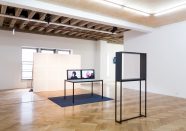
In residence
Avni Dauti and Rebecca VaughanAvni Dauti and Rebecca Vaughan are artists and researchers from Melbourne, Australia. Their work focuses on Deaf histories and repressed historical narratives, encompassing a diverse range of media and strategies including film, installation and writing. At Rupert the duo will be developing a workshop-driven film project – Wooden Hoe – which will involve a number of thematic workshops for Deaf and sign language using participants from Vilnius Mediated entirely in lietuvių gestų kalba (Lithuanian Sign Language). It will examine Deaf histories during the Soviet era and the development and empowerment of sign language use in the region. 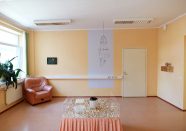
In residence
Eva MustonenEva Mustonen (Estonia) is an installation artist living and working in Tallinn. With a background in textile art and semiotics, her work is heavily influenced by handicraft and physical labor as means of expression. During her stay at RUPERT, Mustonen will work on a collection of humorous short-stories describing her creative process and everyday hassle of making art. Instead of actually making an art piece, the stories propose how the process would look like and what woes it might entail, listing possible outcomes as well as dead-ends. Realizing the ideas only in fiction, the descriptions themselves become the (written) artworks. The stories will be later made into a book. The residency is supported by Nordic Culture Point. |
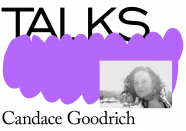
Talk
20 March, 6–8 pm The Aestheticization of the AnthropoceneRupert is pleased to invite all to a talk ‘The Aestheticization of the Anthropocene – A discussion about terminology, periodization and imagery’ given by artist and curator Candace Goodrich. The talk will take place on the 20th March, from 6 pm at Rupert (Vaidilutės str. 79). This event is part of the 7th Rupert Alternative Education programme and will be held in English. Entrance is free and open to the public. More info. 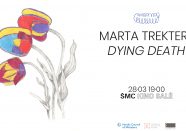
Screening
28 March, 7–8 pm Marta Trektere – Dying DeathRupert kindly invites you to a premiere of Dying Death, a debut short film by Latvian artist Marta Trektere. The screening will take place on March 28th, at the CAC cinema hall (Vokiečių str. 2) from 7pm. The event will include a short introduction by the artist on the history of ASMR ( autonomous sensory meridian response) and will be held in English. Light refreshments will be served. Entrance is free and open to the public. More info. 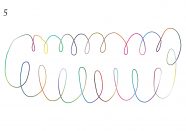
Publication
Online contributions on Rupert's websiteRupert’s five-year-anniversary publication has three components: a physical publication, limited edition works and an online section. The online section is a supplement to the physical publication, and includes sound works, films, texts and GIFs. 
In residence
Marta TrektereMarta Trektere is a performance artist, independent curator and writer based in Riga, Latvia. She’s also co-running artist-run space Four to Seven gallery in Riga. Marta’s works addresses simplicity of complexity in everyday life as well as psychological difficulties in life, art and text working with various media like performance, text, video, sound. In Rupert she will make an Autonomous sensory meridian response (ASMR) video along with her original text performance. It will speculate about the physical, mental and social arousal elements and requirements for human brain and how it works on dreams and stimuli of a human being. The residency is supported by Nordic Culture Point. |
